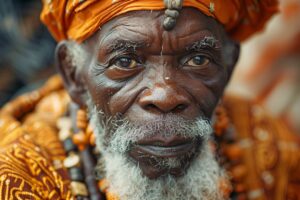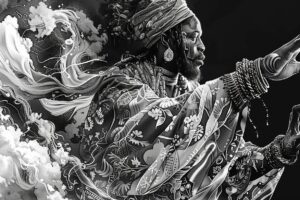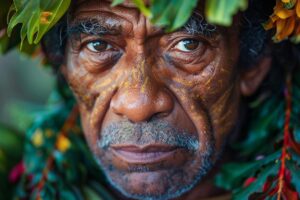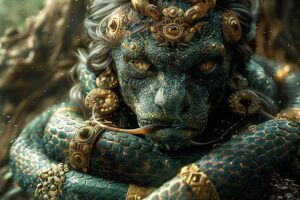Nangananga Goddess: Exploring the Mythology and Meaning

Nangananga is a significant figure in Fiji’s mythology, with origins deeply rooted in Fijian beliefs. She is considered the descendant of the powerful ocean god, Dakuwaqa, creating a special place among Fiji’s deities.
Nangananga’s role as the goddess of death involves guiding souls to the afterlife and judging the deceased. Additionally, she serves as the guardian of the underworld in Melanesian mythology, reflecting the complexity of Fijian spiritual beliefs.
Nangananga Goddess in Fijian Mythology
Deeply rooted in Fijian mythology, Nangananga embodies a significant presence with her origins and role symbolizing the spiritual heritage of the Fijian people. Her connection to Dakuwaqa, the ocean god, underscores her divine lineage and establishes her unique realm among the Fijian deities.
Origins and Significance
Nangananga’s origins trace back to the intricate tapestry of Fijian myths, representing a blend of oceanic influences, afterlife concepts, and human existence. Her significance lies in bridging these realms, reflecting the interconnectedness of life and spirituality in Fijian belief systems.
Connection to Dakuwaqa
As the descendant of Dakuwaqa, Nangananga inherits the power and wisdom associated with the ocean deity, showcasing her authority and divine lineage within Fijian mythology. This connection deepens her role and distinguishes her as a revered figure among the Fijian pantheon.
Unique Realm and Attributes
Nangananga’s realm transcends the boundaries of mortal perception, offering a glimpse into the tranquil and idyllic afterlife envisioned by Fijian mythology. Her attributes embody a balance of justice and mercy, reflecting the intricate tapestry of values engrained in the Fijian cultural fabric.
Role of Nangananga as the Goddess of Death
Nangananga’s role as the Goddess of Death involves various aspects that shape the Fijian belief system regarding the afterlife.
Guiding Souls to the Afterlife
Nangananga is responsible for guiding souls to the afterlife, ensuring a safe transition for the deceased from the earthly realm to the tranquil realm beyond.
Tranquil Afterlife Realm
The afterlife realm overseen by Nangananga is depicted as a peaceful and idyllic place where souls find rest and serenity, reflecting the Fijian view of death as a cyclical journey rather than a finality.
Judging the Deceased
As a deity of justice, Nangananga also acts as the judge of the deceased, evaluating their actions during their earthly existence. Those who lived virtuously are rewarded with eternal happiness in her realm, while those with a troubled past may face a more challenging journey.
Nangananga as the Guardian of the Underworld
In Fijian mythology, Nangananga plays the crucial role of the guardian of the underworld, a realm filled with mystery and significance. Let’s delve into her functions and the intricate beliefs surrounding her domain.
Opposition to Unmarried Souls
Within the Fijian narrative, Nangananga holds a particular stance against unmarried souls attempting to access the underworld. This perspective ties into the societal values and expectations prevalent in Fijian culture, where the concept of marriage and partnership holds deep importance.
Representation in Melanesian Mythology
Beyond Fiji, Nangananga’s presence extends into the broader Melanesian mythology, blending her role with other deities and spiritual elements across the region. Her representation in this wider context showcases the interconnectedness of spiritual beliefs among different cultures in the South Pacific.
Complexity of Fijian Beliefs
The inclusion of Nangananga as the guardian of the underworld underscores the nuanced and rich tapestry of Fijian beliefs. Through her portrayal and interactions within the mythological framework, Fijian spirituality reveals layers of complexity and depth, reflecting a profound understanding of life, death, and the afterlife.
Representation of Nangananga in Modern Society
In today’s contemporary society, the presence of Nangananga is limited due to her association with death and judgment. While Fijian mythology holds a deep place in the culture and heritage of the region, the worship and acknowledgment of Nangananga have dwindled over the years.
- Her depiction in modern media and art is rare, as her image is often perceived as intimidating or foreboding.
- Some individuals may still invoke Nangananga’s name in traditional ceremonies or rituals, honoring her role as the guide to the afterlife and the guardian of the underworld.
- Despite her diminished influence, Nangananga’s legacy continues to resonate in Fijian folklore and spiritual practices.
Overall, Nangananga remains a symbol of the intricate and layered belief system of the Fijian people, serving as a reminder of the interconnectedness of life, death, and the spiritual realm.
.










